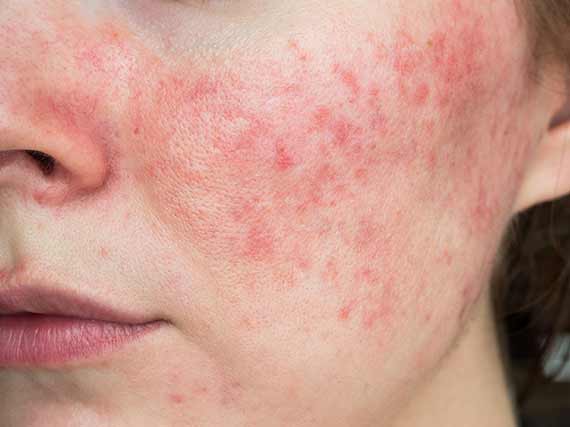Online Dermatology

Online Consultation Benefits
- Easy to use
- No waiting times
- Access wherever you are
- Prescriptions sent to a local pharmacy of your choice
- Get referrals to an NHS hospital near you
- All of your physical and mental concerns are treated in confidence
Dermatology at Consultdoc
You will be able to speak with our online dermatologist, upload photographs of your skin and be examined over video. If medication is recommended your NHS prescription will be sent to a pharmacy of your choice.
Should you require a further specialist assessment or treatment, our GP’s can refer you to a specialist dermatologist or you can also book directly with our Internal Medicine Consultant Dr Shaughan Ude, GMC 6117304.
How do our consultations work?
Three easy steps:

Step 1
Take photos of your skin if you think this will benefit you in relaying your condition.
Step 2
Book And Pay For An Appointment to see our online GP.
Step 3
Consult online with one of our online doctors for an initial assessment and treatment plan.
Skin Condition Support
with Our Online Medical Team
A Selection Of Skin Disorders
Acne
Actinic Keratoses
Alopecia Areata
Atopic Eczema
Balanitis
Basal Cell Carcinoma
Benign Mole
Bowen’s Disease
Cellulitis
Contact Dermatitis
Cysts
Dermatofibroma
Eczema
Erythema Nodusom
Folliculitis
Fungal Nail Infections
Hyperhidrosis
Impetigo
Insect Bites or Stings
Keloids
Lichen Planus
Malignant Melanoma
Molluscum Contagiosum
Pityriasis Rosea
Pityriasis Vesicolor
Psoriasis
Rosacea
Scabies
Seborrhoeic Dermatitis
Seborrhoeic Keratosis
Shingles
Solar Keratosis
Squamous Cell Carcinoma
Telogen Effluvium
Tinea Capitis
Urticaria
Vitiligo
Warts
Allergies
Our Related Blogs
Fungal Rash That Appears Mostly In Summer – Pityriasis Vesicolor
Lyme Disease: How Common Is It And What To Do After A Tick Bite?
What is Acne?
Acne is a very common skin condition. It causes different types of spots known as blackheads, whiteheads, and pus-filled spots called pustules. Acne ranges from a few spots on the face, neck, back, and chest, which most teenagers will have at some time, to a more severe problem that may cause scarring and reduce self-confidence.
About 95% of people aged 11 to 30 are affected by acne to some extent. Treatment for acne depends on how severe it is. It can take several months of treatment before acne symptoms improve.
What treatment can you expect from Consultdoc?
Our online GP can prescribe, for example, topical retinoids and/or oral medications like antibiotics to help treat mild to moderate acne. In severe cases, you will be recommended to see a dermatologist, to which we can refer you.
What is Actinic keratoses?
Actinic keratoses forms on areas of sun-damaged skin found predominantly on sun-exposed parts of the body, particularly the forearms, backs of the hands, face, ears, bald scalp and the lower legs. They may also occur on the lips.
What causes actinic keratoses?
It is caused by cumulative sun exposure over many year and are therefore more common in older people.
What treatment can you expect from Consultdoc?
If you have actinic keratoses, our doctor will advise that you can use sunscreen with a sun protection factor (SPF) of at least 30 before going out into the sun and reapply regularly. Wear a hat and clothing that fully covers your legs and arms when you’re out in the sunlight.
Our online GP can prescribe special cream and gels, these include 5-fluorouracil or imiquimod which are effective treatments for actinic keratoses.
What is Alopecia Areata?
Alopecia areata is a common cause of non-scarring (does not cause scarring to the scalp) hair loss that can occur at any age. It usually causes small, coin-sized, round patches of baldness on the scalp.
What causes alopecia areata?
Hair is lost because it is affected by inflammation.It is thought that the immune system, the natural defence which normally protects the body from infections and other diseases, may attack the growing hair.
What treatment can you expect from Consultdoc?
Alopecia areata itself has no adverse effect on physical health. The treatments that are available online include: steroid cream, minoxidil, and dithranol cream.
What is Atopic Eczema?
Atopic eczema is also known as atopic dermatitis and is the most common form of eczema, a condition that causes the skin to become itchy, dry, and cracked. It is more common in children, often developing before their first birthday, but it may also develop for the first time in adults. It is usually a long-term condition, although it can improve significantly, or even clear completely, in some children as they get older.
What causes atopic eczema?
There is no known single cause for atopic eczema. It is a complex condition involving genetic, allergy problems, and environmental factors, leading to a dysfunctional skin barrier. Hair is lost because it is affected by inflammation. It is thought that the immune system, the natural defense which normally protects the body from infections and other diseases, may attack the growing hair.
What treatment can you expect from Consultdoc?
Our doctors can recommend the regular application of a moisturiser also known as an emollient and washing with a moisturiser instead of soap. Topical steroid creams or ointments will usually improve the redness and itching of active atopic eczema.
What is Balanitis?
What causes balanitis?
Balanitis may be caused by different conditions such as irritations or infections of the skin of the penis.
What treatment can you expect from Consultdoc?
Our doctors will advise you to pull back your foreskin and wash your penis every day with warm water. Depending on the suspected cause of balanitis, they can prescribe antibiotics, antifungal, or a mild steroid cream.
What is Basal Cell Carcinoma (BCC)?
BCC is a type of skin cancer typically an ulcer with a raised rolled edge or a pearly nodule on the skin.
What causes Basal Cell Carcinoma?
It is mostly caused by exposure to ultraviolet (UV) light from the sun or from sunbeds. BCC’s can occur anywhere on the body but are most common on areas that are exposed to the sun such as your face, head, neck, and ears.
What treatment can you expect from Consultdoc?
Our doctors will usually recommend an NHS dermatology referral if you have a skin lesion that raises the suspicion of basal cell carcinoma.
What is a Benign Mole?
Benign moles are small, coloured spots on the skin which are usually harmless. You will only need to see a doctor if you notice you have a mole that has recently changed colour or has more than one colour or has changed size and shape.
What treatment can you expect from Consultdoc?
Our doctors can examine your mole from photos that you send in prior to your online consultation. They will advise you and are also able to refer you to a dermatologist if they have concerns about a mole on your skin.
What is Bowen’s Disease?
Bowen’s disease is a very early form of skin cancer that is confined to the outer layer of the skin. It is not a serious condition. Bowen’s disease usually appears as a red scaly patch on the skin that has clear edges and does not heal.
What causes bowen’s disease?
Most cases of Bowen’s disease develop as a result of long-term sun exposure, having weak immunity or after radiotherapy treatment. The concern is that Bowen’s disease can eventually develop into a different type of skin cancer called squamous cell skin cancer if it is left undiagnosed or neglected.
What treatment can you expect from Consultdoc?
Our doctors can prescribe imiquimod or 5-fluorouracil cream which is applied to the affected skin regularly for a few weeks. It may cause your skin to become red and inflamed before it gets better. Our GP’s can also refer you to a dermatologist to consider other treatment.
What is Cellulitis?
Cellulitis are common infections of the skin. It makes your skin painful, hot and swollen. The area usually looks red, but this may be less obvious on brown or black skin.
What causes cellulitis?
If there is a break in your skin through scratches or an insect bite, a bacteria (germ) can get into this break and cause an infection in the skin.
What treatment can you expect from Consultdoc?
Our doctors will be able to prescribe a short course of antibiotic treatment. Make sure you let the doctor know if you have any allergies to antibiotics so you can be prescribed the right medication that works for you.
What is Contact Dermatitis?
Contact dermatitis is a type of eczema triggered by contact with a particular substance.
What causes contact dermatitis?
Contact dermatitis can be caused by contact with irritating substances like detergents, solvents and hot water or when allergy develops to a specific substance that has been in contact with the skin. Example substances like hair dye, nail cosmetics, perfumes, metals such as nickel, rubber, and preservatives used in some cosmetics etc.
What treatment can you expect from Consultdoc?
Our doctors will usually advise you to try and avoid the irritants or allergens that trigger your symptoms, but understand this can be difficult sometimes. They will advise you on the regular application of moisturisers and can prescribe some steroid creams or ointments.
Our Qualified Team
Our doctors have the General Medical Council (GMC) full registration with a licence to practise.
Doctors on Consultdoc platform are qualified General Practitioners with Membership of the Royal College of General Practitioners (MRCGP).


Register now
Following your consultation with us, the doctor will be able to offer you treatment options such as a prescription, advice on self help measures, follow up appointments or simply refer you to a hospital specialist.